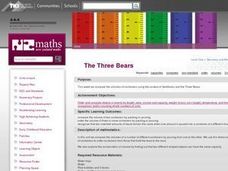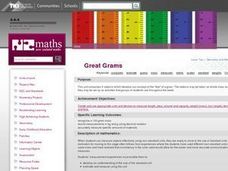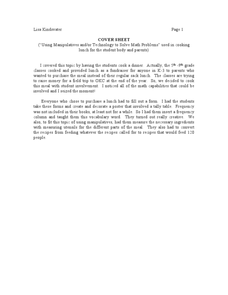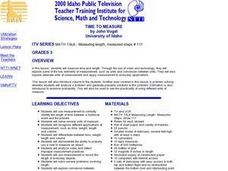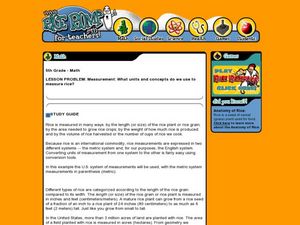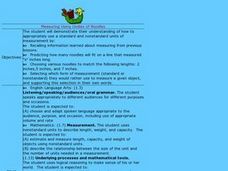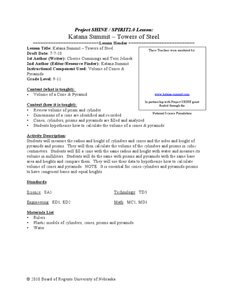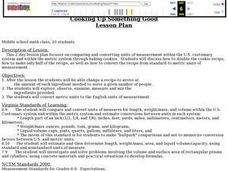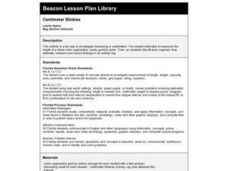Curated OER
Commutative Property
First graders use various models to learn the Commutative Property of Addition. In this Commutative Property lesson, 1st graders use other students, counters, balances, and dominoes to apply the addition property. Students solve addition...
Curated OER
The Three Bears: Comparing and Ordering
Students explore comparing and ordering volume of containers. They use the context of Goldilocks and the Three Bears to compare the volume of various containers by packing or pouring.
Curated OER
Great Grams
Students measure objects effectively using standard units, They examine how consistency in the units used allows for easier and more accurate communication of mass measures.
Curated OER
"Using Manipulatives and/or Technology to Solve Math Problems" by Cooking Dinner
Students explore math functions by preparing a meal. In this food measurement lesson, students examine a recipe for a meal and alter the size of the recipe based upon the amount of servings needed. Students utilize manipulatives to...
Curated OER
Density
Students determine the density of different substances. In this physical science lesson, students rank them according to their density. They discover the relationship between volume and density.
Curated OER
Time To Measure
Third graders measure time and length. Through the use of video and technology, they explore key elements of measurement, such as units and conversion between units. They explore alternate units of measurement and apply measurement to...
Curated OER
What units and concepts do we use to measure rice?
Fifth graders look at different ways to measure rice. In this rice measurement lesson, 5th graders see the metric and customary measurements. They discuss how rice is measured by length, area of the field, weight, volume and yield.
Curated OER
Measuring Supporting Structures
Students calculate the volume of the Pantheon's columns and estimate changes in weight given different parameters.
Curated OER
Oranges and Stopwatches
Students measure various attributes of an orange. They discuss the attributes of an orange that can be measured, develop a list of attributes and describe how they can measure it, and rotate through four stations measuring the volume,...
Curated OER
Measuring Using Oodles of Noodles
First graders explore and evaluate the use of both standard and nonstandard forms of measurement. They use noodles to measure the lengths of each line they have drawn. They glue the noodles to the page under the given line.
Curated OER
How Do Your Students Measure Up?
Students participate in a paper folding activity that has them create a ruler for measuring to the closest 1/16th of an inch.
Curated OER
Volumw Measurement, English System
Eighth graders biew each volume container and discuss where they have seen them in their home, and how they have seen them used. They explore the different names of volume sizes and their equivalents towards one another. Students...
Curated OER
Measuring Water Temperature
Students measure the temperature of three water sources. They collect data points every second for twenty five seconds for each sample using Lego Robolab temperature sensors, complete a worksheet, and analyze the data.
Curated OER
Towers of Steel
This lesson starts with geometers discussing how to find the volume of a cone and pyramid, using what they know about the volume of a cylinder or prism. Then, using the formulas, they calculate the volume of cones and...
Curated OER
Box-and-Whisker Plots
Eighth graders measure in feet and inches and convert to explore the relationship between the converted measurements. In this measurement activity, 8th graders use the whisker and box plot to represent the measurement of a cat. ...
Curated OER
Geometry and Spatial Sense
Students investigate geometric shapes in 2 and 3 dimensions. In this geometry lesson, students create a model chocolate factory working in groups and using an actual cake. Students take a quiz about measurement equations...
Consortium for Ocean Science Exploration and Engagement (COSEE)
Ocean Acidification: Whats and Hows
Open this lesson by demonstrating the production of acidic carbon dioxide gas by activated yeast. Emerging ecologists then experiment with seashells to discover the effect of ocean acidification on shelled marine organisms. They measure...
Curated OER
Cooking Up Something Good
Students compare and convert units of measurement within the United States customary system and within the metric system by baking cookies. Students discuss how to double the cookie recipe, how to make only half of the recipe, and how to...
Curated OER
Lesson 5: Boyle's Law
Students participate in a lab to verify Boyle's Law using applied force (weight) to do work on a closed isolated system of air. "Elasticity of Gases Apparatus, BASIX" from Sargent-Welch is the syringe apparatus used to measure volume...
Curated OER
Relative Weight
Second graders distinguish the difference between pounds and ounces and arrange manipulatives from heaviest to lightest.
Curated OER
Matter
Young scholars complete a unit of activities to learn about states of matter and how to measure matter. In this matter lesson, students complete 8 lessons to learn about matter, its states, and how to measure matter.
Pennsylvania Department of Education
Volume of Compound Figures
Fifth graders use patterns, models and relationships to solve equations. In this equations lesson plan, 5th graders define vocabulary for equations and complete worksheets explaining variables and solving problems.
Curated OER
It Matters
Students use descriptive vocabulary to discuss the attributes of matter. Then, they sort objects or pictures by the type of matter they are comprised of. Finally, students match objects of matter with similar attributes and create a...
Curated OER
Centimeter Slinkies
Third graders estimate and measure the length of a whole color-segmented, candy gummy worm. Then, as students bite off each segment, they estimate, measure and record findings in an activity log.

